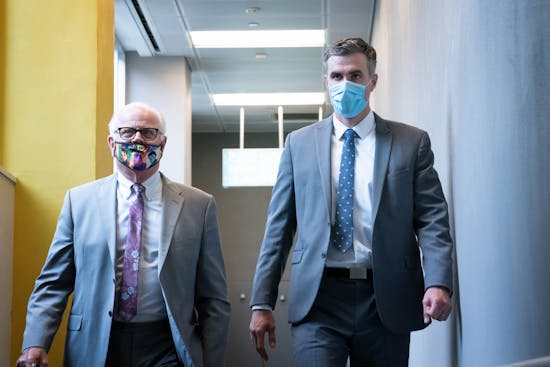The judge presiding over the cases against four former Minneapolis police officers charged in the killing of George Floyd issued a gag order Thursday prohibiting attorneys and others related to the cases from publicly divulging "opinions, strategies, plans or potential evidence."
Hennepin County District Judge Peter Cahill issued the unusual order a day after two defense attorneys, Earl Gray and Thomas Plunkett, spoke to the Star Tribune in response to Gray's motion to dismiss the charges against his client, Thomas Lane.
"The court finds that continuing pretrial publicity in this case by the attorneys involved will increase the risk of tainting a potential jury pool and will impair all parties' right to a fair trial," Cahill wrote. He said it covers "all parties, attorneys, their employees, agents or independent contractors working on their behalf."
Cahill prohibited them from disclosing information or materials related to the case personally or through third parties to the media or general public. He noted that public documents are available on a state website and exhibits can be viewed at the courthouse.
At the former officers' second court hearing in late June the judge admonished attorneys, public officials, attorneys for Floyd's family and others for talking about the case, warning that publicity could taint potential jurors and force the trial or trials to move out of Hennepin County.
Veteran defense attorney Joe Friedberg called gag orders "extremely rare."
However, they're not unheard of. In 1999, a Carlton County judge issued a gag order in the case against Donald Albin Blom, who was convicted of killing Kathlyn "Katie" Poirier. In 2003, a Ramsey County judge issued a gag order in National Guard Maj. Gen. Eugene Andreotti's lawsuit against then-Gov. Tim Pawlenty for the administration's investigation into complaints against Andreotti.
Gray said Wednesday that he wanted the court to make two body camera videos he filed with the motion available for public viewing. The footage was recorded during Floyd's May 25 arrest by Lane and his former colleague, J. Alexander Kueng.
The court did not list the footage on a public website tracking the cases as exhibits submitted with Gray's motion, nor did the judge make them available for public viewing. Gray's motion was filed Tuesday and made public Wednesday. He included transcripts of the footage and a transcript of Lane's interview with an investigator.
On Thursday a court spokesman said the videos will be made available for public viewing at a later date.
Plunkett, who is representing Kueng, did not comment on Gray's motion or the footage, but said Wednesday that he was considering filing a motion to dismiss the case against his client.
Lane, Kueng and former officer Tou Thao are charged with aiding and abetting murder and manslaughter.
Their former colleague, Derek Chauvin, is charged with one count each of second-degree murder, third-degree manslaughter and second-degree manslaughter for killing Floyd, who died after he was handcuffed and pinned to the ground for nearly eight minutes. Chauvin knelt on his neck despite Floyd's pleas that he couldn't breathe and warning that he was dying.
A 1966 U.S. Supreme Court decision granted judges broad discretion to issue gag orders to limit influence on potential jurors, said Joseph Daly, professor emeritus at Mitchell Hamline School of Law.
"They don't want the case tried in the newspaper or on TV," Daly said. "The problem is the U.S. Supreme Court … has not laid out a single clear test for when gag orders violate the First Amendment" right to free speech and a free press.
The judge's order applies to both defense attorneys and the prosecution, which is being led by Minnesota Attorney General Keith Ellison's office with assistance from the Hennepin County Attorney's Office.
Daly surmised that the order's reference to the lawyers' "agents" includes Public Safety Commissioner John Harrington, Minneapolis Police Chief Medaria Arradondo and Minneapolis Mayor Jacob Frey. Friedberg said it would also include Gov. Tim Walz. The court declined to specify who was covered by the order.
At a June court hearing, defense attorneys accused those public officials and Ellison with prejudicing the case through their public remarks. Arradondo, Harrington and Walz have called Floyd's death a "murder," a legal term implying a conviction. Ellison has said he is confident a jury will convict the former officers.




